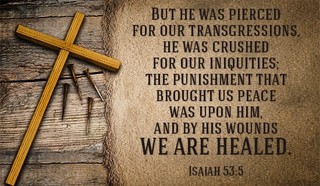
- Recent Translations
- All Translations
Ésaïe 53:5
Share
Settings
Images for Ésaïe 53:5

Ésaïe 53:5 Meaning and Commentary
But he was wounded for our transgressions
Not for any sins of his own, but for ours, for our rebellions against God, and transgressions of his law, in order to make atonement and satisfaction for them; these were the procuring and meritorious causes of his sufferings and death, as they were taken upon him by him to answer for them to divine justice, which are meant by his being wounded; for not merely the wounds he received in his hands, feet, and side, made by the nails and spear, are meant, but the whole of his sufferings, and especially his being wounded to death, and which was occasionally by bearing the sins of his people; and hereby he removed the guilt from them, and freed them from the punishment due unto them: he was bruised for our iniquities;
as bread corn is bruised by threshing it, or by its being ground in the mill, as the manna was; or as spice is bruised in a mortar, he being broken and crushed to pieces under the weight of sin, and the punishment of it. The ancient Jews understood this of the Messiah; in one place they say F15,
``chastisements are divided into three parts, one to David and the fathers, one to our generation, and one to the King Messiah; as it is written, "he was wounded for our transgressions; and bruised for our iniquities":''and in another place F16,
``at that time they shall declare to the Messiah the troubles of Israel in captivity, and the wicked which are among them, that do not mind to know the Lord; he shall lift up his voice, and weep over the wicked among them; as it is said, "he was wounded for our transgressions"''the chastisement of our peace was upon him;
that is, the punishment of our sins was inflicted on him, whereby our peace and reconciliation with God was made by him; for chastisement here does not design the chastisement of a father, and in love, such as the Lord chastises his people with; but an act of vindictive justice, and in wrath, taking vengeance on our sins, of our surety, whereby divine wrath is appeased, justice is satisfied, and peace is made: and with his stripes we are healed;
or "by his stripe" F17, or "bruise": properly the black and blue mark of it, so called from the gathering and settling of the blood where the blow is given. Sin is a disease belonging to all men, a natural, hereditary, nauseous, and incurable one, but by the blood of Christ; forgiving sin is a healing of this disease; and this is to be had, and in no other way, than through the stripes and wounds, the blood and sacrifice, of the Son of God. Christ is a wonderful physician; he heals by taking the sicknesses of his people upon himself, by bearing their sins, and being wounded and bruised for them, and by his enduring blows, and suffering death itself for them. The Targum is,
``when we obey his words, our sins will be forgiven us;''but forgiveness is not through our obedience, but the blood of Christ.
F15 Mechilta apud Yalkut, par. 2. fol 90. 1.
F16 Zohar in Exod. fol. 85. 2. See also Midrash Ruth, fol. 33. 2. and Zohar in Deut. fol. 117. 3. and R. Moses Hadarsan apud Galatia de Arcan. Cath. Ver. I. 8. c. 15 p. 586. and in I. 6. c. 2. p. 436.
F17 (wtrbxb) "per livorem ejus", Munster; "livore ejus", V. L. Montanus, Vatablus; "tumice ejus", Junius & Tremellius; "vibico ejus", Cocceius; "vibicibus ejus" Vitringa.

